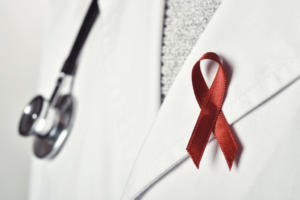 As we end 2018, I like to take a look back and review some of the good things that have happened this year. I will primarily focus on new treatments. But first a little history. In 2007, we had a banner year with three new drugs approved. These were not just any drugs but they were very important for a couple of reasons. First of all, Maraviroc was an important addition because it blocked the ability of HIV to infect blood cells in a unique way.
As we end 2018, I like to take a look back and review some of the good things that have happened this year. I will primarily focus on new treatments. But first a little history. In 2007, we had a banner year with three new drugs approved. These were not just any drugs but they were very important for a couple of reasons. First of all, Maraviroc was an important addition because it blocked the ability of HIV to infect blood cells in a unique way.
It represented a new class of drugs that previously didn’t exist called Entry Inhibitors. It was a powerful drug that didn’t have a lot of side effects. The downsides were that in order to use Maraviroc, a special test was required to make sure the virus was sensitive. This test was not cheap. Also, the drug had to be dosed twice a day, which unfortunately meant patients were less likely to take all their doses.
Darunavir was approved in the protease inhibitor class. While there were several drugs already available in this class, Darunavir was designed to be effective in people whose virus was resistant to these other drugs in the protease inhibitor class. This is very important to understand. People infected with HIV need treatment for life (until we find a cure). This could mean 40 years of treatment or more.
This means that there have to be many treatment options. When the virus becomes resistant to a particular drug that no longer works, that is a lost option. Sometimes, developing resistance to one drug in a class reduces the effectiveness of ALL drugs in that class. This is not the case for protease inhibitors. In many situations, if one of them no longer works because of resistance, another one may stillbe effective. Darunavir was a great drug because it often would be effective if other protease inhibitors stopped working.
The last drug approved in 2017 was Raltegravir (Isentress). It was the first approved drug in the new class of integrase inhibitors, the most powerful drugs used to treat HIV infection. So 11 years ago, we got some really good drugs that saved the lives of patients who had possibly run out of treatment options.
Now as we approach the end of 2018. We have almost a replay of 2007. Three new drugs and a unique combination product have been approved. Bictegravir belongs to the integrase inhibitor class of HIV drugs It is similar to another integrase inhibitor called Dolutegravir that is commonly used. Patients who have failed treatment with older drugs in the integrase inhibitor class, like raltegravir and elvitegravir may be able to use Bictegravir.
Bictegravir is combined with two other powerful drugs (tenofovir alafenamide and emtricitabine) in the three drug combination Bictarvy. Unlike many of the drugs from a couple decades ago, this combinations protects patients from some of the side-effects that can damage parts of the body like the kidneys and bones.
Dolutegravir is part of the first approved two-drug combination that is a complete regimen. Dolutgravir and Rilpivirine (a reverse transcriptase inhibitor) are powerful enough to suppress HIV without a third drug. This two-drug combination is called Juluca . This combination is safe to use in patients that may have other medical conditions like heart disease. Since HIV patients will require decades of treatment and many different regimens, if two drugs can work as well as three drugs, that allows the patients to have more options down the line. Both combinations, Bictarvy and Juluca are one pill dosed once a day.
As we did in 2007, this year we also got a new drug from a totally new class. Ibalizumab (Trogaro) is actually an antibody that blocks the sites the HIV uses to infect blood cells (lymphocytes), thereby protectingthe cells. So it works similar to Maraviroc, but by blocking a different target. Because antibodies are proteins, it cannot be taken orally like a pill or tablet, but must be infused into the bloodstream. So the downside is that ibalizumab must be administered by your medical provider.
The good news is that a single dose last for two weeks. While it should be effective in a wide range of HIV patients for now, it is only approved for use in patients where their HIV has developed resistance to many other drugs and they therefore have very few treatment options. This drug could literally be a life saver for patients who have virtually no other effective drugs they can take.
The new drug Doravirine (Pilfetro) is in the same class of reverse transcriptase inhibitors as the drugs Efavirenz (Sustiva), Rilpivirine (Edurant) and Etravirine (Intellence). This drug takes the best qualities of the other drugs in the class. It is like Etravirine in that it may be effective in patients that have failed Efavirenz or Rilpivirine. It is like Efavirenz in that it is dosed once a day, and like Rilpivirine in having few side effects. There is a three-drug combination available as a single pill that contains Doravirine, lamivudine and tenofovir called Delstrigo.
Having new treatment options is always a good thing. And improving treatment leads me to another big story from 2018 reminding us that “Treatment is Prevention”. The proof of that concept is captured in the slogan “U=U” or Undetectable = Untransmittable. As I have written about in earlier articles, if the treatment is effective, the person will have an undetectable viral load and will not be able to infect another person or transmit the virus.
Studies have confirmed this principal in heterosexual couples where one person is HIV positive and controlled on treatment and the other partner is uninfected. Because the viral load is undetectable in the infected partner, the uninfected partner is protected during intercourse without using condoms!
Patients who are HIV-infected, undetectable and inject drugs intravenously also do not spread the infection if they share needles. But the largest study to date involved gay men couples. After several years and over 70,000 sex acts, the HIV-infected men undetectable on treatment did not infect their partners during sex acts involving gay men. NO TRANSMISSIONS OCCURRED!
This has provided the strongest evidence to date the U=U and that one of the best ways to prevent new HIV infections is to find everyone who is infected and get them on treatment and KEEP them on treatment and in care.
Now I am not telling anyone NOT to use condoms! Being undetectable can prevent a person from spreading HIV but NOT other sexually-transmitted diseases like, gonorrhea, syphilis or viral hepatitis. Only condoms can protect against all of these Discuss this with your medical provider if you have more questions.
I hope everyone has a great holiday and is looking forward to a prosperous New Year!
I’ll see you on the other side.
 Dr. Crawford has over 25 years of experience in the treatment of HIV. While at Howard University School of Medicine, he worked in two HIV-specialty clinics at Howard University Hospital. He then did clinical research as a visiting scientist with the AIDS Clinical Trials Group (ACTG) at Johns Hopkins University School of Medicine. He served as the Assistant Chief of Public Health Research with the Military HIV Research Program where he managed research studies under the President’s Emergency Plan for AID Relief (PEPFAR) in four African countries.
Dr. Crawford has over 25 years of experience in the treatment of HIV. While at Howard University School of Medicine, he worked in two HIV-specialty clinics at Howard University Hospital. He then did clinical research as a visiting scientist with the AIDS Clinical Trials Group (ACTG) at Johns Hopkins University School of Medicine. He served as the Assistant Chief of Public Health Research with the Military HIV Research Program where he managed research studies under the President’s Emergency Plan for AID Relief (PEPFAR) in four African countries.
He is currently working in the Division of AIDS in the National Institutes of Health. He has published research in the leading infectious diseases journals and serves on the Editorial Board of the journal AIDS. Any views and perspectives in his articles on blackdoctor.org are not representative of any agency or organization but a reflection of his personal views.








